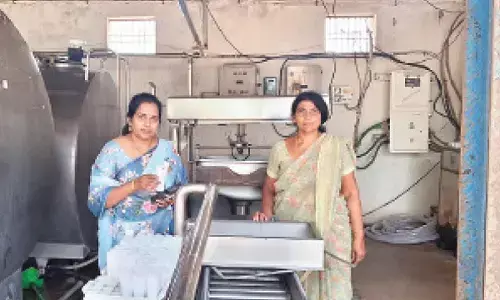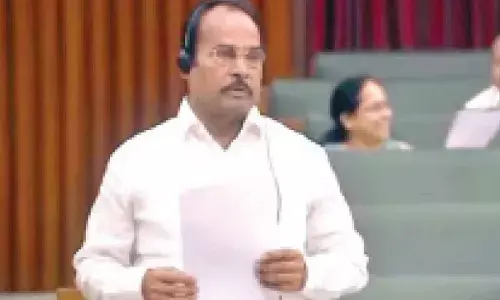 After addressing the welfare agenda for general public to some extent, both the Andhra Pradesh and Telangana governments are now slowly gearing up to focus on to contract employees’ conditions and welfare. They consider it is an essential and crucial component of political-economy and a must for both the states as delivering the welfare benefits and development agenda on the lines as they prefer to be rolled out in the next one to two years period.
After addressing the welfare agenda for general public to some extent, both the Andhra Pradesh and Telangana governments are now slowly gearing up to focus on to contract employees’ conditions and welfare. They consider it is an essential and crucial component of political-economy and a must for both the states as delivering the welfare benefits and development agenda on the lines as they prefer to be rolled out in the next one to two years period.
In fact, both the states are in the verge of expanding high voltage infrastructure development, be it roads, metros, water, electricity etc, hence, they require full support and cooperation of employees including contract or outsourced workers.
According to some estimates, both the states employ about 2.7 lakh contract workers - 1.3 lakh in Telangana and 1.4 in Andhra - outsourced on ad hoc basis.
Although successive governments felt the need to making the contract employees permanent, considering their contribution to the work, various factors have come in their way including strong opposition from the permanent employees.
The fact remains, that the services of contract or outsourcing employees are paramount importance for the governments as most of them engaged in various welfare or infrastructure functions. Interestingly, for the last one decade or so, most the outsourcing employees are being employed in various high end digital services including on-line payment platforms etc. It is now felt by the senior officers to train these outsourcing staff in the functions of Government-to-Citizen Services including subsidy payment services.
It is unfortunate that the job contracting companies are engaging youth for various contract jobs, especially in the areas of digitization trades. Though being lured with offers to get permanent in the government services, these companies recruit the youth and exploits them, but as the government has no particular policy they were never been made permanent.
Interestingly, even the legislations look at the relationship as principle and agent, and government has a role to protect the contract employees from being exploited; they were left in the lurch. Interestingly, the successive governments and political parties have looking at these ‘outsourcing job seekers’ as an effective electoral tool to play around.
Employee sources said that most of the contract workers are engaged in various projects and schemes directly and there is no proper understanding that they are part of the listed contract employees or not. In fact, the government needs to update the entire list of contract employees district-wise, department-wise and project-wise.
What the governments plan Recently, the Telangana Chief Minister K Chandrasekhar Rao has announced to regularise the services of those working as contract employees in various state departments and even felt to stop offering jobs on contract basis henceforth. And he also said that the wages of outsourcing employees will be increased once the finance department submits its report. He asked the government departments to prepare the list of contract employees, as the promise made during the agitation for separate Telangana, who were at the forefront of the struggle.
On the other hand, even Andhra Pradesh government is considering revising the wages of contract employees and it has constituted the Cabinet sub-committee headed by state's Finance Minister Y Ramakrishnudu, to look into the issue. All most in all the 107 and odd departments the contract workers are employed in Andhra Pradesh. The officials are preparing list of contract employees which is to be ready before the next Cabinet sub-committee meeting.
Apex Court’s opposition Supreme Court has observed in State of Karnataka Vs Umadevi and Other, 2006, case "A sovereign government, considering the economic situation in the country and the work to be got done, is not precluded from making temporary appointments or engaging workers on daily wages. Going by a law newly enacted, The National Rural Employment Guarantee Act, 2005, the object is to give employment to at least one member of a family for hundred days in a year, on paying wages as fixed under that Act. But, a regular process of recruitment or appointment has to be resorted to, when regular vacancies in posts, at a particular point of time, are to be filled up and the filling up of those vacancies cannot be done in a haphazard manner or based on patronage or other considerations. Regular appointment must be the rule." The apex court felt the (proposed) regularisation is on the ground that the appointment of contract/outsourced employees itself was based on conditional notification.
As the governments are taking up large scale infrastructural projects on the one hand and the industry and polity appears nonplussed on the other, both the states are poised to take on high-velocity economic activity. Hence it is imperative for the governments to depend on the outsourcing/contract employees with expertise at high-end and punctuality at low-end jobs.
Thus the governments have to address the issues of contract/outsourcing employees with sympathetic and human face. No doubt, in the wake of Supreme Court ruling against regularization, they may have to very well evolve a method within the permitted limits of Constitution and without violating the apex court directive.
Further, the governments have to enhance the skills of employees including contract workers, and also improve working environment of both outsourced and permanent employees in the government sector, which is by all means biggest employer in the country.
 After addressing the welfare agenda for general public to some extent, both the Andhra Pradesh and Telangana governments are now slowly gearing up to focus on to contract employees’ conditions and welfare. They consider it is an essential and crucial component of political-economy and a must for both the states as delivering the welfare benefits and development agenda on the lines as they prefer to be rolled out in the next one to two years period.
After addressing the welfare agenda for general public to some extent, both the Andhra Pradesh and Telangana governments are now slowly gearing up to focus on to contract employees’ conditions and welfare. They consider it is an essential and crucial component of political-economy and a must for both the states as delivering the welfare benefits and development agenda on the lines as they prefer to be rolled out in the next one to two years period.












